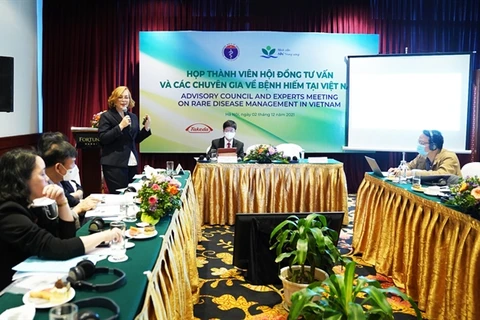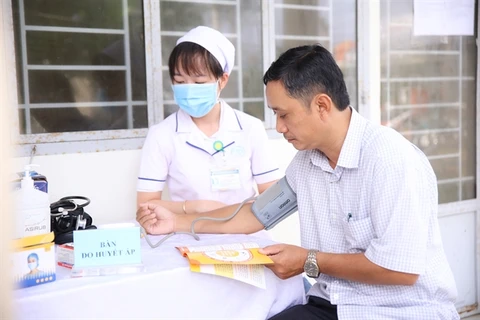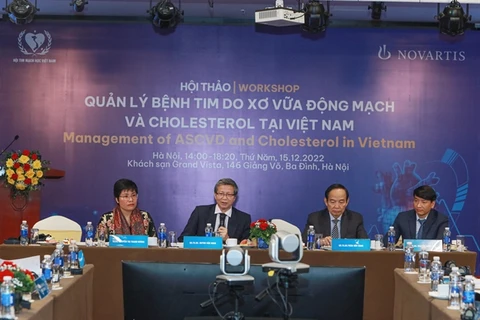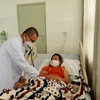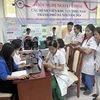 A series of events was held in many localities in response to the Rare Disease Day (February 28) (Photo:VietnamPlus)
A series of events was held in many localities in response to the Rare Disease Day (February 28) (Photo:VietnamPlus) Hanoi (VNA) - It is estimated that almost one in 15 people, or around 6 million people are affected by approximately 10 rare diseases in Vietnam, according to the World Health Organisation (WHO).
The information was revealed by the Vietnamese Organisation for Rare Diseases at a series of events, which was co-organised by the National Children's Hospital (NCH), Ho Chi Minh City Children's Hospital 1 and Sanofi Vietnam, in response to the Rare Disease Day (February 28).
According to Associate Professor Vu Chi Dung, Director of the NCH’s Centre of Endocrinology, Metabolism, Genetics and Molecular Therapy, the hospital has so far received and provided treatment for about 17,400 patients with rare diseases.
Most of them suffered from congenital metabolic disorders, he said, adding that these diseases may lead to death or mental and physical sequelae but early detection can save a child’s life and can even help him develop normally.
 Many meaningful activities are held to support the rare disease patient community. (Photo: VietnamPlus)
Many meaningful activities are held to support the rare disease patient community. (Photo: VietnamPlus) Dr. Do Phuoc Huy, from the Vietnamese Organisation for Rare Diseases, said a study by the Asia Pacific Alliance of Rare Diseases Organisations showed that only 18% of patients responded that they received proper treatment and 27% could not access diagnostic equipment.
Meanwhile, only 5% of the rare diseases have an approved treatment However, up to 9% of patients do not have access to these therapies.
Rare diseases do not only affect patients' health, study and work but also impact their relationships and family’s economy. It is noteworthy that 78% of people living with rare diseases feel stress and 70% of patients’ parents lose jobs after their children are diagnosed with these diseases.
According to experts, due to its rarity, it takes a long time, even up to 10 years for a patient to get a proper diagnosis. Delays in diagnosis lead to improper treatment, causing physical, mental and financial distress to patients and their families.
In addition, patients are disappointed because many rare diseases still have no treatment or the cost of treatment is beyond their ability.
Emin Turan, General Director of Sanofi Vietnam, said that his company has been promoting faster and more accurate diagnosis, offering treatment, and improving the lives of patients with rare diseases in Vietnam as well as other countries in the world. In Vietnam, it has assisted patients in accessing alternative therapy with the provision of free medicines since 1997.
 Associate Professor Vu Chi Dung, Director of the NCH’s Centre of Endocrinology, Metabolism, Genetics and Molecular Therapy (Photo: VietnamPlus)
Associate Professor Vu Chi Dung, Director of the NCH’s Centre of Endocrinology, Metabolism, Genetics and Molecular Therapy (Photo: VietnamPlus) Associate Professor Vu Chi Dung, Director of the NCH’s Centre of Endocrinology, Metabolism, Genetics and Molecular Therapy, underlined the need to train medical staff and raise people’s awareness about these diseases as early detection is one of the best solutions. He also highlighted the significance of close coordination between medical specialties to shorten the time for patients with rare diseases to be diagnosed correctly.
The Ministry of Health has devised many policies for patients with rare diseases such as establishing an advisory council and building a list of rare diseases. Guidelines and diagnoses relating to rare diseases have been put forth to help medical staff and patients' families better understand the issue and enhance early detection and timely treatment.
In particular, the ministry has adopted support policies regarding drugs to treat rare diseases and cover health insurance payments to help people with rare diseases receive early and more effective treatment./.
